Texas Baptists pray, condemn white nationalism after shooting
Texas Baptist leaders uniformly expressed grief and pledged prayer after a mass shooting in El Paso, but some also called on Christians to “do more than pray” and condemn the white nationalist ideology that apparently motivated the shooter.
Law enforcement officials believe the alleged killer, a 21-year-old white male from Collin County, published an online anti-immigrant “manifesto” prior to the shooting and targeted Hispanics as his victims.
Condemn ‘evil ideologies’
That makes the tragedy “especially painful,” said Jesse Rincones, executive director of the Hispanic Baptist Convention of Texas.

“As believers in Christ, we know the power of praying for God’s peace, comfort and strength for all those affected by this loss. We will pray. But we must do more than pray,” Rincones said.
“It is especially painful to know that those murdered in El Paso were targeted because they were Hispanic. Because they looked like the people who worship in our churches, preach in our pulpits, serve in our communities and minister on our mission trips. Targeted because they look like our mothers, fathers, children and family.
“It isn’t enough to just denounce this act of domestic terrorism. We call upon every Christian—in the pastorate, in politics, and in their personal lives—to condemn the evil ideologies of white nationalism and racial hatred wherever they are found, including our national dialogue.”
In the Sermon on the Mount, Jesus taught his followers that evil thoughts and murder come “from the heart,” Rincones noted.
“May God transform our hearts to experience healing, renewal, and forgiveness. And may he give us the courage to act—personally and politically—to protect innocent lives from having to experience such tragedies in the future,” he said.
‘Deep-seated fear and hatred’
Singling out Hispanics as targets, as the shooter in El Paso apparently did, reveals “deep-seated fear and hatred,” said Gus Reyes, director of the Texas Baptist Christian Life Commission.
“The murder of any person should grieve our souls. When a group of people are murdered because of their ethnic background, it pushes us to even deeper levels of grief because it’s not just loss of life; it’s an expression of deep-seated fear and hatred,” Reyes said.
“This is so contrary to the gospel and to Jesus’ message to love all people. In moments like these, because of our faith, we can be ambassadors of Christ, offering his help, his hope and his peace.”
‘Horrific ideology’ of ‘ethnic replacement’
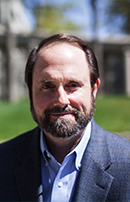
In his Aug. 6 daily email and online devotional, Texas Baptist theologian and cultural commentator Jim Denison wrote about the “horrific ideology” of “ethnic replacement” described in the online document police link to the alleged shooter.
Denison, chief executive officer of the Denison Forum, described ethnic replacement as the belief that “white Europeans” are being reverse-colonized by immigrants of color.
That racist ideology also motivated the shooter who killed 51 people at mosques in Christchurch, New Zealand, the shooter who killed 11 people in a Pittsburgh synagogue, and the shooter who killed nine African Americans at a church in Charleston, S.C., he asserted.
“The El Paso shooter and other mass murderers see immigrants as a threat to our nation, culture and way of life. Christians should view them in a completely opposite way,” wrote Denison, former pastor of Park Cities Baptist Church in Dallas and later theologian-in-residence at the Baptist General Convention of Texas.
He quoted Exodus 22:21 and Leviticus 19:34, verses that command God’s people to love—not oppress—the “stranger who sojourns with you.”
“The way we treat the ‘stranger’ is the way we treat Jesus,” Denison said, citing Matthew 25:38, 40.
“Rather than seeing immigrants as a threat to our way of life, let’s lead them to the One who is ‘the way, the truth and the life,’” he wrote, encouraging Christians to view migration as “a missional opportunity for the gospel.”
Both prayer and advocacy
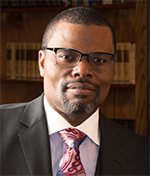
BGCT President Michael Evans, pastor of Bethlehem Baptist Church in Mansfield, called Texas Baptists to prayer and to advocacy.
“Our hearts go out to the victims. We pray for all those who have been victimized by this tragedy that was perpetrated on innocent people,” Evans said. “The posture of the church should be one of prayer as well as advocacy on behalf of victims of gun violence.”
Evans offered Ephesians 6:23 as a benediction to the hurting: “Peace to the brothers and sisters, and love with faith from God the Father and the Lord Jesus Christ.”
Gratitude for El Paso churches
BGCT Executive Director David Hardage expressed thanksgiving for the ministry El Paso churches provided in the wake of the mass shooting.
Texas Baptist Men disaster relief volunteers from churches in the El Paso area responded in the hours immediately after the shooting, offering support to first responders and to everyone at the family reunification center.
More than 400 people attended a Sunday evening prayer service at First Baptist Church in El Paso led by pastors of seven Baptist churches in the area.
“Our Texas Baptist family is heartbroken over the tragic and senseless shooting of this past weekend in El Paso,” Hardage said. “We are so grateful for the wonderful churches and pastors in that city who have responded so well with the love of Christ and will continue to do so. Thank you for all your prayers for those individuals and families personally impacted and for those providing care and comfort.”
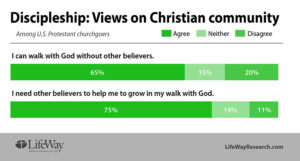 “I believe this is primarily a discipleship issue,” Priest said. One factor he said has led to a “spiritual apathy” in the pews is “the lack of pastors and spiritual leaders equipped to effectively preach and teach a text-driven life application of God’s word.”
“I believe this is primarily a discipleship issue,” Priest said. One factor he said has led to a “spiritual apathy” in the pews is “the lack of pastors and spiritual leaders equipped to effectively preach and teach a text-driven life application of God’s word.”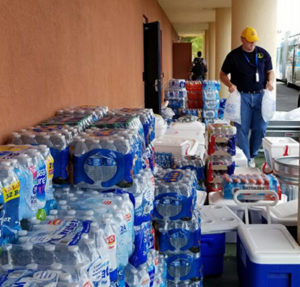


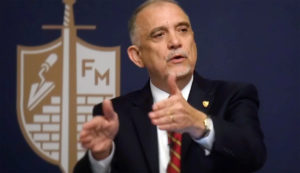
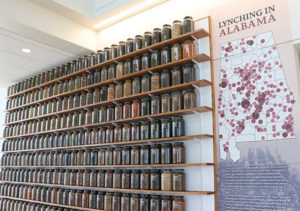
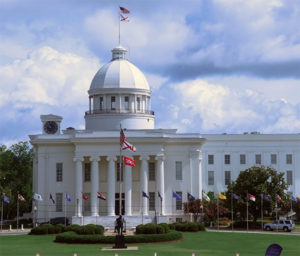


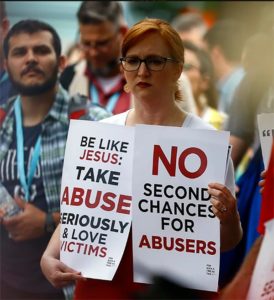

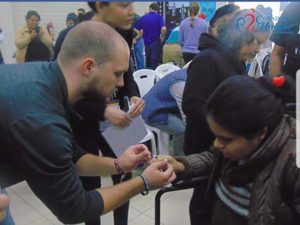

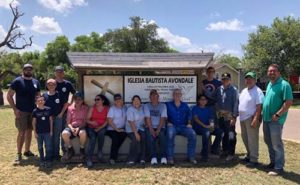
 When given a list of potential facets that could be “very important” to their identity, most respondents point to their role in their family (73 percent) and the good they do (57 percent). Around half say what they have achieved (51 percent) and their role as friend (49 percent) is vital to their identity.
When given a list of potential facets that could be “very important” to their identity, most respondents point to their role in their family (73 percent) and the good they do (57 percent). Around half say what they have achieved (51 percent) and their role as friend (49 percent) is vital to their identity.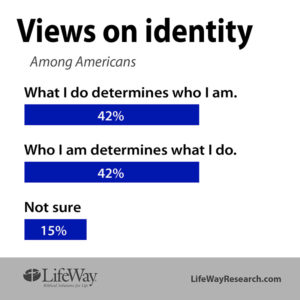 The LifeWay Research survey also found Americans evenly split on the relationship between identity and behavior.
The LifeWay Research survey also found Americans evenly split on the relationship between identity and behavior.